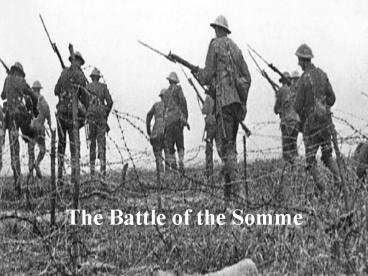The Battle of the Somme - PowerPoint PPT Presentation
1 / 15
Title:
The Battle of the Somme
Description:
The Battle of the Somme Overview July 1 November 18, 1946 Allies (British & French) vs. Germany Started during siege on Verdun One-day record for bloodiest battle ... – PowerPoint PPT presentation
Number of Views:1082
Avg rating:3.0/5.0
Title: The Battle of the Somme
1
The Battle of the Somme
2
Overview
- July 1 November 18, 1946
- Allies (British French) vs. Germany
- Started during siege on Verdun
- One-day record for bloodiest battle in British
history - 58,000 troops (1/3 total) lost on 1st day
- Prolonged because both sides thought enemy was
exhausted victory was near - Became British symbol of futility of war
3
The Players
- Allies
- British CIC Sir Douglas Haig
- Gen. Henry Rawlinson
- French CIC Joseph Joffre
- Gen. Ferdinand Foch
- Germany
- General Max von Gallwitz
- Both
- Lots of Corpses
4
The Plan (Joffre)
- Joint British-French attack
- mostly French
- Objective drain German reserves
- also for territorial gain
5
Change of Plans (Haig)
- French preoccupied by Verdun
- British play bigger role
- New aim relieve pressure on French at Verdun by
diverting German forces - Strategy
- Preliminary artillery bombardment to open up
forward German defences - Make way for 3 cavalry divisions to seize German
front lines
6
(No Transcript)
7
Battle Progression
- British (FAILURE!)
- British Expeditionary Force (BEF) advanced from
north - Week-long bombardment ineffective warned Germans
of coming attack - Expected Germans to be crushed
- Repeatedly reached but failed to penetrate German
lines
- French (SUCCESSFUL?)
- French Army advanced from south
- Bombardment took place hours before actual
battle greater element of surprise - Germans thought French were busy at Verdun
- Achieved most of their objectives
8
Important Dates
- June 24th BEFs preliminary bombardment begins
- July 1st Battle commences with detonation of 17
mines under German strong points - July 11th BEF finally secures 1st line of
German trenches (w/o breakthrough) - Germans transferred troops from Verdun to Somme
- September 15th BEF uses tanks for the 1st time
- Gain under 1 km of ground
- October Joffre urges Haig to continue
offensive, tables turning at Verdun - November 13th BEF captures fort at Beaumont
- November 18th Snowy weather terminates battle
9
Statistics
- Allies
- 27 divisions (750,000 men)
- Casualties
- 420,000 British
- 200,000 French
- 1.4 for every in. (7 mi. total)
- Germany
- 16 divisions
- 500,000 casualties
10
Warfare
- Allies
- Tank used for the first time
- Effective but unreliable
- Only 24 out of 50 actually worked
- Munitions turned out to be duds
- Badly constructed
- Ineffective
- Failed to go off (iron harvest)
- Germany
- Front line barbed wire
- Remained intact
- Concrete bunkers
- Sheltered troops from artillery
- Machine guns
- Used between bombardments
- Easily targeted soldiers in No Mans Land
- Forced BEF back into their trenches
11
Private Fred Ball
- French soldier
- Excerpt taken from memoirs
- Never sought nor received promotion after end of
war
12
- Just before we arrived in our jumping-off
trench something happened which I can never
forget. A young soldier of my 1 own section was
struck by a shell fragment square between the
eyes. His cries haunt me now. Mother of God!
Mother of God! he shrieked time and time again.
We left him behind where he lay, whimpering
Mother of God! Good God! I'm blind! It got in
my ears. Mother of God! I reiterated, scarcely
knowing what I was saying. - Then I realized the meaning of the words. In
a flash of violent emotion I denied Her there and
then. If She existed, why were we here? She
didn't exist. There was no such thing.
13
Philip Gibbs
- Official British war correspondent
- Optimistic, patriotic tone
- Covered opening day of battle
- Fallaciously praised British progress efficacy
14
- The British attack began with the great
bombardment several days before July 1st and was
a revelation, to the German Command and to the
soldiers who had to endure it, of the new and
enormous power of our artillery. - A number of batteries were unmasked for the
first time, and the German gunners found that in
"heavies" and in expenditure of high explosives
they were outclassed. - They were startled, too, by the skill and
accuracy of the British gunners whom they had
scorned as "amateurs" . - After the first week of battle the German
General Staff had learnt the truth about the
qualities of those British "New Armies" which had
been mocked and caricatured in German comic
papers. They learnt that these "amateur
soldiers" had the qualities of the finest troops
in the world - not only extreme valour but skill
and cunning, not only a great power of endurance
under the heaviest fire, but a spirit of attack
which was terrible in its effect.
15
The Aftermath
- Allies advanced approx. 7 mi.
- Succeeded in diverting the Germans allowing
French victory at Verdun (at what cost?) - Large-scale British commitment led to increased
British influence within the Allies






























![get [PDF] DOWNLOAD On the Psychology of Military Incompetenc PowerPoint PPT Presentation](https://s3.amazonaws.com/images.powershow.com/10112843.th0.jpg?_=20240830086)
